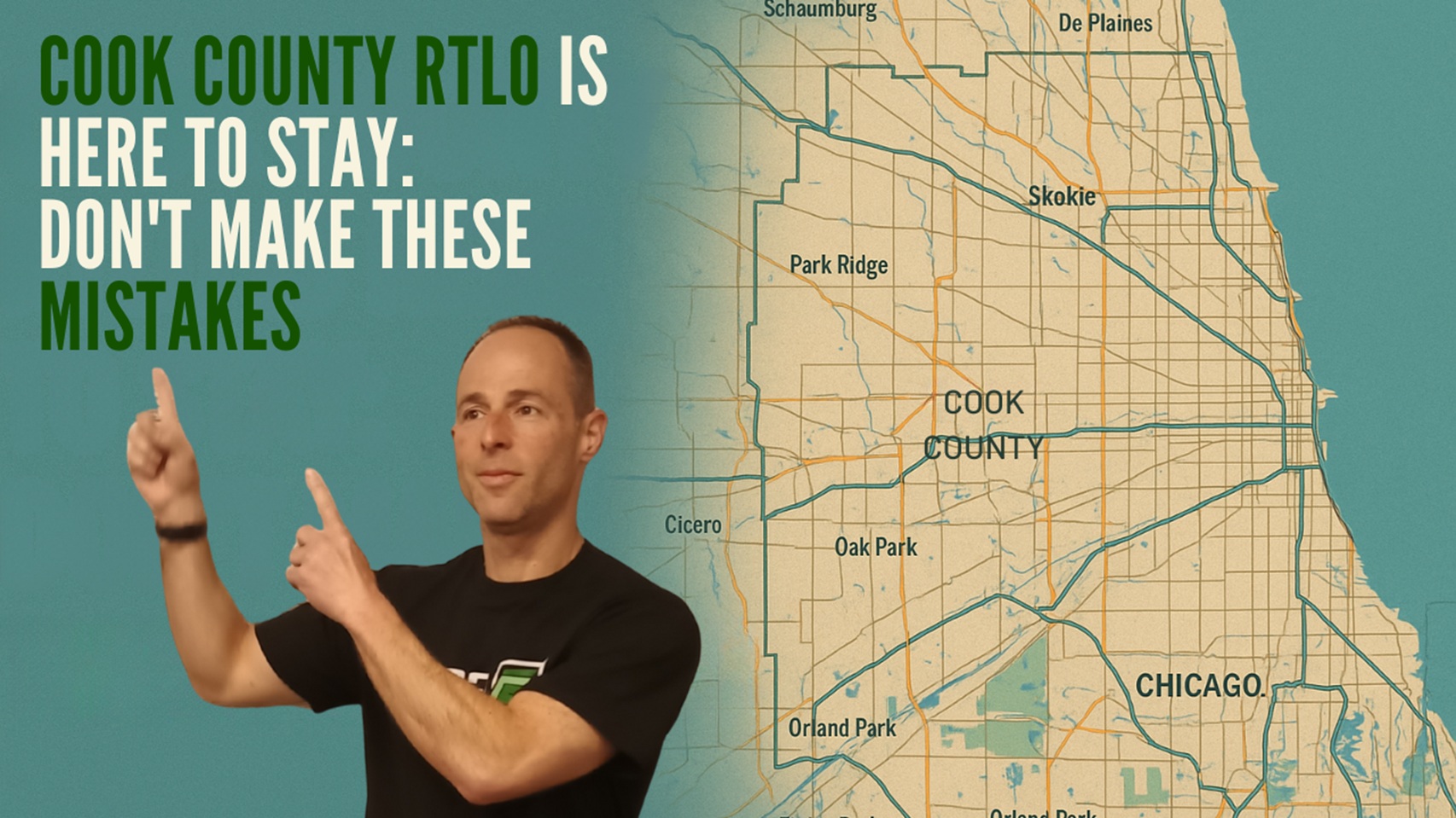
Author: Mark Ainely | Partner GC Realty & Development & Co-Host Straight Up Chicago Investor Podcast
If you own rental property in suburban Cook County(different in Chicago proper), you’re not playing by the same rules you were five years ago. Since June 1, 2021, the Cook County Residential Tenant Landlord Ordinance (RTLO) went into effect and reshaped the way landlords and tenants interact.
And let me tell you, this isn’t the type of ordinance you can skim over or assume you’re “close enough” on. One small mistake in your lease, one misstep in handling a repair, or one attempt to push a tenant out without following the exact process, and you’re staring down double or triple damages, attorney fees(yours and the tenants), and months of wasted time in court and preparing for court.
It is amazing how many Palatine, Des Plaines, Schaumburg, Tinley Park, Oak Lawn, or Berwyn investors I talk to weekly and they still do not know this Cook County specific ordinance even exists.
I’ve seen it happen over and over: landlords who think they know enough, only to learn the hard way that ignorance of the RTLO is expensive. But I’ve also seen landlords who understand the law, use it as a framework, and actually improve both their profitability and their tenant relationships.
So, let’s break down what the RTLO really means for you as a housing provider, how to avoid the common traps, and where you can turn for help.
🔎 Having Better Tenants Reduces Your Risk
As a side note before we get going, hear me out. When it comes to RTLO in Cook County or CRLTO in Chicago your risk of dealing with a tenant complaint goes down drastically if you put the right tenant in your place. The right tenant starts with pricing your place right when you go to market it for rent.
Before we go further, do you even know if your rent is right? 👉 Get a Free Rent Analysis in under a minute and find out where you stand today.
What Is the Cook County RTLO and Why It Matters
The RTLO was designed to protect tenants in suburban Cook County by laying out their rights and your obligations. It covers almost every city in Cook County except Chicago (which has its own RLTO), Evanston, Oak Park, and Mount Prospect.
If you’re renting in places like Cicero, Arlington Heights, Hoffman Estates, Chicago Ridge, Franklin Park, or Barrington, you’re under RTLO rules.
The ordinance requires landlords to:
Provide safe, habitable housing.
Follow strict rules on repairs, disclosures, and notices.
Cap late fees and itemize move-in costs.
Avoid retaliation when tenants assert their rights.
Attach an RTLO summary to every lease.
And if you don’t? Tenants can sue, terminate leases, or recover damages, sometimes double damages.
👉 Want a complete breakdown of what you’re responsible for? Download our Cook County RTLO Ebook, the guide every suburban landlord should have saved on their desktop.
🚪 Place Better Tenants from Day One
Most landlord problems start with the wrong tenant. That’s when late payments, repair battles, and RTLO disputes show up. Don’t roll the dice.
👉 See how our Tenant Placement Service can fill your unit fast, with qualified tenants who pay and stay.
How the RTLO Impacts Your Lease
Let’s start with the paperwork. If your lease hasn’t been updated since before June 2021, I am 100% confident you are out of compliance with the RTLO.
Here’s what your lease now needs:
All household members listed.
Rent due dates explicitly stated.
No prohibited provisions (like tenants waiving rights).
Move-in fees itemized, not padded with maintenance costs.
Utility cost disclosures.
The Cook County RTLO summary attached.
Without these, your lease may not hold up in court, and your tenant has the upper hand.
📞 Unsure Where You Stand?
If you’re wondering whether your lease, rent, or tenant process is compliant, you’re not alone.
👉 Grab 15 minutes with us and get clarity: Talk With Our Team For Free.
Common Landlord Mistakes Under the RTLO
Here’s where landlords get tripped up most often:
Lockouts. Changing locks, shutting off utilities, or removing doors is prohibited. Tenants can sue for two months’ rent (or double damages) plus legal fees.
Late Fees. You can’t just pick a number. The RTLO caps it at $10 for the first $1,000 and 5% of anything above that.
Repairs. If tenants give you written notice and you don’t act within 14 days, they may legally withhold rent or even terminate the lease.
Retaliation. If a tenant complains to code enforcement or organizes a tenant group, you can’t respond by raising rent or refusing renewal. Courts assume retaliation if it happens within a year of their complaint.
Foreclosure Notices. If your property goes into foreclosure, you must disclose it within 7 days. Fail, and tenants can walk away from the lease, with damages.
Every one of these mistakes has cost landlords thousands. And in nearly all cases, they could have been avoided with updated systems and documentation.
Tenant Rights vs. Landlord Rights
The RTLO gave tenants more rights than before, but landlords still have power, as long as they follow the process.
Tenants gain:
Right to habitable housing.
Right to timely repairs.
Right to disclosure of costs.
Right to “Pay to Stay” once during tenancy by paying all back rent and fees.
Landlords keep:
The ability to issue 5-day notices for nonpayment.
The right to evict for material lease violations.
The authority to declare a unit abandoned after 32 days with no rent and no contact.
The ability to dispose of abandoned property after 7 days (with conditions).
The trick is doing it by the book. Serving improper notices or skipping required disclosures will sink your case before it even starts.
The Bigger Picture: Risk Management
Landlords often ask me: “Isn’t all this just going to make it harder to be a landlord in Cook County?”
My answer: It depends on how you approach it.
If you see the RTLO as red tape to dodge, you’ll constantly be at risk. If you see it as the rulebook you need to master, you’ll protect yourself from lawsuits, reduce turnover, and run a tighter, more profitable rental business.
Because let’s face it, most lawsuits, evictions, and conflicts don’t come out of nowhere. They start with poor tenant screening, unclear leases, or landlords trying to take shortcuts.
Which brings me to the most essential part of all this: tenant placement.
👉 If you want to minimize RTLO risk from day one, don’t go about this alone and check out our Tenant Placement Service. We place hundreds of tenants a year, and we know how to find qualified renters who won’t drag you through court.
Why Pricing Matters More Than Ever
With the RTLO in play, the wrong tenant can cost you double. Overpricing your rental attracts desperate applicants, people more likely to default, fight you on repairs, or abuse “Pay to Stay.”
On the flip side, underpricing leaves money on the table.
That’s why knowing your rental’s true market value is critical.
👉 Use our Free Rent Analysis tool. In under a minute, you’ll know if you’re priced right for the Cook County market. This one step alone can save you months of vacancy or thousands in missed rent.
Professional Property Management = Peace of Mind
The RTLO is just one layer. Add in Chicago’s RLTO, federal fair housing laws, Cook County’s Just Housing Amendment, local inspection codes, and it’s a lot for a self-managing landlord to juggle.
That’s why so many landlords hand it off to professionals.
With GC Realty’s Chicago Property Management services, we:
Use compliant leases that meet RTLO standards.
Handle tenant placement and screening.
Manage all repairs within the 14-day legal requirement.
Serve notices properly and track compliance timelines.
Keep documentation to protect landlords in disputes.
Instead of stressing over what you don’t know, you can focus on your investment returns, while we make sure you don’t end up in court over a technicality.
Talk With Mark or Shea Today
Every property, every lease, and every landlord situation is a little different. The RTLO doesn’t allow one-size-fits-all shortcuts.
If you’re unsure whether your lease is compliant, how to handle a current tenant issue, or whether property management is proper for you, let’s talk.
👉 Schedule a quick conversation with our team:Let’s figure this out together
Fifteen minutes can lower your risk and prevent you from making thousands of dollars in mistakes.
Final Thoughts
The Cook County RTLO changed the game, but it doesn’t have to make being a landlord harder. If you stay compliant, price correctly, and place the right tenants, you’ll find you can still run a profitable, low-stress rental business.
What this ordinance did was raise the bar. Landlords who operate casually or cut corners will feel the pain. Landlords who treat their rental like a business, with systems, documentation, and compliance, will thrive.
So ask yourself: do you know where your lease stands? Is your rent priced right? Do you have a process for notices, repairs, and disclosures?
If the answer is “not really,” don’t wait until a tenant drags you to court. Use the resources here:
Free Rent Analysis – Find out if you’re priced right.
Cook County RTLO Ebook – Download the full guide.Tenant Placement Service – Get better tenants from day one.
Property Management Service – Let the experts handle compliance.
Talk With an Expert – Let’s figure this out together.
Because when it comes to property management in Chicago and suburban Cook County, the most significant risk isn’t the RTLO, it’s not knowing how to play by its rules.
Who Is On Your Team?
We’ve shared a lot of information here on investing in real estate locally in Chicagoland. If you live outside the area, it may seem overwhelming for those wanting to invest in the Chicago market. But we just look at it as a team sport.
Who’s on your investing team? Do you even have a team? GC Realty & Development, LLC has a dedicated team of professionals willing to share decades of experience in all facets of real estate investment. We handle everything from brokerage, leasing, and property management. Whether you hire us or not, we’re happy to provide our resources and expertise.
What gets me up in the morning and keeps me going 12 hours a day is the ability to add value to local area investors in Chicago and beyond! Those who connect with me often hear me say that our goal is to bring value to everyone we come in contact with.
We hope that in return, they will one day hire us for our tenant placement or property management services, refer us to someone they know, or leave a review about our services. We would clearly love all three; however, we’re happy whenever we get the opportunity to help!
Reach out today!

Partner / Co-Host of Straight Up Chicago Investor Podcast

 Vendor Portal
Vendor Portal



